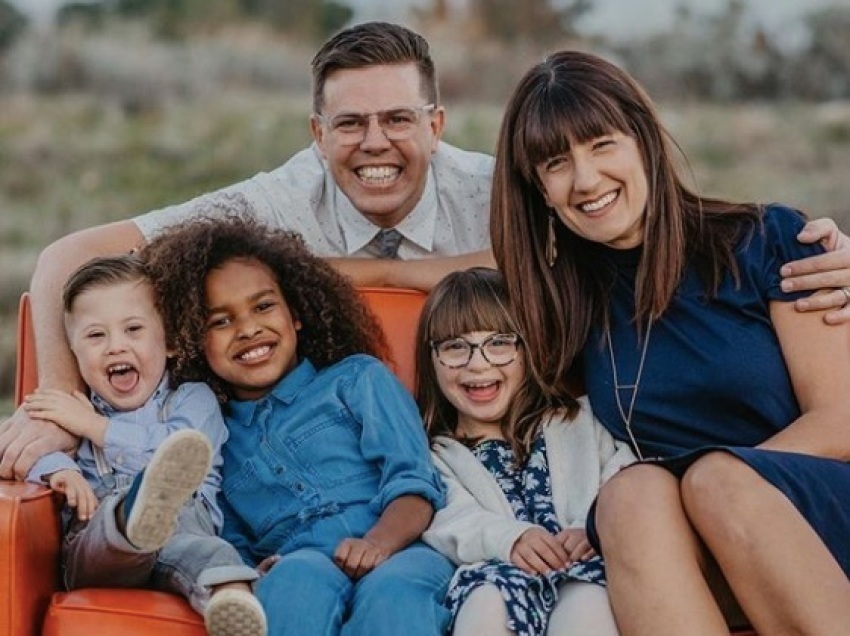Mother of 2 children living with Down syndrome urges churches to foster diverse communities

The Church should be known for embracing those typically pushed to the edges of society; a place where the unique talents, abilities, and needs of others are both recognized and celebrated.
But far too often, the Church has fallen short of including those often ignored by society.
Heather Avis, a mother to three adopted children — two of whom have Down syndrome — is urging the Church to make room for those who typically don’t have a seat at the table.
“When we’re looking at Scripture and it talks about being ‘fearfully and wonderfully made,’ there’s not an asterisk there; it doesn’t say “if you fit this certain mold,’” she told The Christian Post. “Every single one of us are image bearers of God. When God created my kids, He gave them an extra chromosome with pleasure and for His glory.”
In 2008, Avis and her husband, Josh, adopted their first daughter, Macyn, followed by their second daughter, Truly, in 2011. And in 2013, their son, August, was born and came home to be theirs.
A popular speaker, blogger, and author who regularly documents her family’s life on social media, Avis said her “whole world became richer” the second she met her first child.
“People with differences offer so much to the world and to our lives,” she said. “They’re fully valuable and worthy as they are, and my life is so much fuller because they’re in my life and because they’ve put me into communities with people that are different from me. I instantly gained an understanding of what it means to be human and what gives worth and value to a person.”
In her latest book, Scoot Over and Make Some Room, Avis shares the joyful moments of parenting — but also the heartbreaking moments when her children were denied a place at the table and when she had to fight for their voices to be heard — particularly in the school system.
“The school systems are very segregated; those with disabilities are expected to learn in a different classroom because it’s thought that it’s what’s best for them,” she said. “The expectation is that my children can’t learn alongside their peers. What I’m asking our educators to do is to see the assets that my kids bring and not their deficits. Let’s look at what they can do and not at what they can’t.”

And an inclusive church, Avis emphasized, is even more impactful than an inclusive school setting. She offered several recommendations for how churches can do a better job fostering diverse communities. The first: Simply take notice.
“When there’s a quiet moment in the church, if you’re not hearing any sounds, then chances are you don’t have people with different abilities in your church,” she said. “Notice who’s not in the room; who is missing in the room.”
Then, make space where everybody belongs.
“The thing with people with different abilities is that everyone is so different. It’s about meeting the needs of the individual where they’re at,” Avis said. “It’s as simple as asking parents, ‘what does your kid need?’ that’s huge.”
“I wish,” she added, “it was as simple as ‘do these five steps to be more inclusive,’ but really that’s not how this community works. It’s about meeting people where they are, creating genuine relationships, and being willing to adjust for the one. It’s the radical idea of, 100 of us are going to shift everything so one person can be a part of our church."
Until the Body of Christ fully embraces those who act, look, and grow a little differently, it won’t experience the fullness of God, Avis contended.
“If we are not allowing people who are different than us to be fully included in our churches, we’re missing out on the fullness of God,” she stressed. “If everyone is like us, whether it be ability or race, we’re missing out on the fullness of God because His image is in each person as they are. There's no asterisk. I believe that until the Church fully embraces those that are different and is intentional in doing so, it doesn’t know fully who God is.”
“There’s so much we can learn from people with different abilities,” Avis added. “Take time to develop relationships with those who aren’t like you. Your life will be so much richer and fuller. What makes someone worthy of love is simply that they are alive and deeply loved by Jesus.”



























